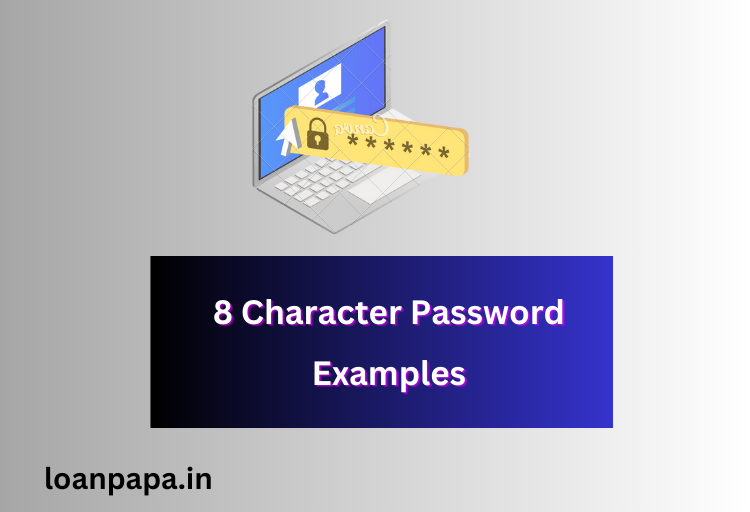
Table of Contents
- 1 8 Character Password Examples
- 1.1 Introduction
- 1.2 Understanding Password Strength
- 1.3 Why 8-Character Passwords?
- 1.4 Character Types to Include
- 1.5 Examples of Strong 8-Character Passwords
- 1.6 Creating Custom 8-Character Passwords
- 1.7 Password Managers: Your Digital Guardian
- 1.8 Multi-Factor Authentication (MFA)
- 1.9 The Importance of Regular Updates
- 1.10 Tips for Keeping Your Passwords Secure
- 1.11 Common Password Mistakes to Avoid
- 1.12 Educating Others on Password Security
- 1.13 Conclusion
- 2 FAQs
8 Character Password Examples
8 Character Password Examples: In an increasingly digitized world, where personal and financial information is stored online, the importance of robust password security cannot be overstated. The strength of your passwords plays a pivotal role in safeguarding your sensitive data from potential cyber threats. In this article, we will delve into the realm of 8-character password examples, exploring effective strategies to create strong and memorable passwords that enhance your online security.
Introduction
With the growing prevalence of online activities, from banking to social media, the security of your accounts hinges on the strength of your passwords. In this article, we will explore the world of 8-character passwords, providing you with examples and tips to bolster your online defenses.
Understanding Password Strength
Before we dive into specific examples, it’s essential to grasp what makes a password strong. A strong password is one that is difficult for others to guess or crack. It should ideally be a combination of uppercase and lowercase letters, numbers, and special characters.
Why 8-Character Passwords?
You might wonder why we focus on 8-character passwords specifically. While longer passwords are generally more secure, 8-character passwords strike a balance between security and memorability. They are also commonly used as minimum requirements by many online platforms.
Character Types to Include
To create a robust 8-character password, include a mix of the following:
- Uppercase letters
- Lowercase letters
- Numbers
- Special characters (e.g., !, @, #, $)
Examples of Strong 8-Character Passwords
- P@ssw0
- Secur1Ty
- 8Ch@ract
- $tr0ngP@
- L0ckD0wn
- F1$hyB@t
- Tr!pleX9
- W0rld#42
- Pa$$wrd
- 2F@st4U
- N0#Mercy
- C@tchTh!s
- 7Sunsh!n
- Pr0t3ct!
- $eCur3It
- 8Chr$Exm
- P@ssw0R!
- D1g1t@l!
- B3tt3rMe
- L0g!nNow
These examples showcase the diversity and strength that can be achieved within the constraints of an 8-character password.
Creating Custom 8-Character Passwords
Crafting your unique 8-character password is vital. Avoid using easily guessable information such as birthdays or common phrases. Instead, combine elements in a way that is meaningful to you but not obvious to others.
Password Managers: Your Digital Guardian
Managing multiple passwords can be challenging. Utilizing a password manager can simplify this task by securely storing and autofilling your passwords when needed.
Multi-Factor Authentication (MFA)
MFA adds an extra layer of security by requiring users to provide two or more verification factors before granting access. This significantly enhances your account’s security.
The Importance of Regular Updates
Periodically changing your passwords is a good practice. It reduces the risk associated with potential data breaches and unauthorized access.
Tips for Keeping Your Passwords Secure
- Never share your passwords.
- Avoid using the same password across multiple accounts.
- Be cautious of phishing attempts.
- Keep your operating system and software up to date.
Common Password Mistakes to Avoid
Learn from common password mistakes:
- Using easily guessable information.
- Ignoring password length and complexity.
- Writing down passwords in plain sight.
Educating Others on Password Security
Share your knowledge about password security with friends and family to collectively strengthen online safety.
Conclusion
In the ever-evolving landscape of cybersecurity, protecting your digital identity is paramount. Crafting strong, 8-character passwords, utilizing password managers, and embracing multi-factor authentication are essential steps toward fortifying your online security.
FAQs
Are longer passwords always more secure?
While longer passwords are generally more secure, a well-structured 8-character password can still provide robust protection.
What is the ideal frequency for changing passwords?
It’s advisable to change your passwords every three to six months or after any security breach.
Can I use spaces in my passwords?
Not all websites or systems allow spaces in passwords. It’s best to check the specific requirements of the platform you’re using.
Is it safe to store passwords in my browser?
While browsers offer password storage, using a dedicated password manager is often more secure.
What should I do if I forget my password?
Most websites provide a “Forgot Password” option that allows you to reset your password through email verification.
Read also:
20 Best Killer Whale Facts for Kids (Orca)
What is the Ugliest Zodiac Sign? Debunking Myths About Cancer
10 Best Fun Facts About Octopus for Kids
What Hospice Does Not Tell You: Uncovering the Unspoken Realities